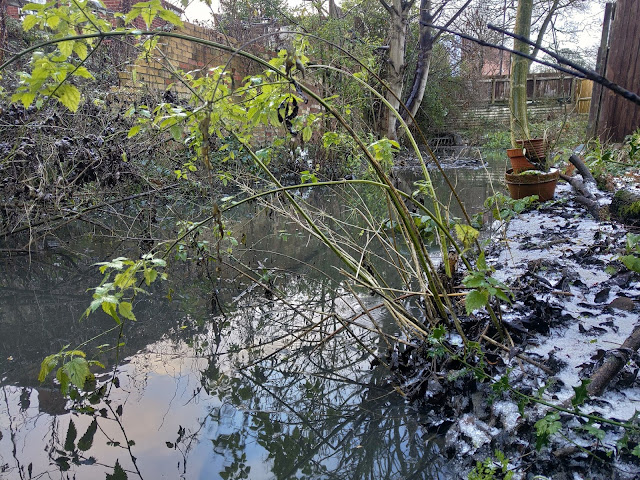So winter's here again. Damp, mild and free of frost, but just about recognisable. I suppose this is what winters will be like from now on - or maybe wetter, and probably wilder. This year I could have done with some sharp, cold familiarity - whitened playing fields, frozen mud puddles - but so far we've only had this dark and wet settlement. A dull and uneventful solstice. Maybe it helps that I'm not one to think much about the spiritual significance of the seasons. I like the simple facts of the outdoors - the way weather, landscape and buildings change, and affect mood. And winter can make the urban nature lover feel even more secular than usual. The tide of green recedes, revealing the full extent of the built environment - at least while daylight lasts. For the remaining eighteen hours of the day, shape, colour and movement are made uncertain and indistinct by constant unnatural light. The natural world seems unreachable for much of the time.
One winter, I remember walking, just before dawn, on the scrubland at the top of Wallsend dene. I was probably still half asleep, or still fixated on a bad dream, but I recall being suddenly startled by the appearance of the moon through the trees that mark the edge of the valley. It was so small and strangely yellow, and seemed too close to the horizon, as if it had been toppled from its orbit. A vague thrill of apocalypse went through me.
As I moved closer, I saw that it was the Lidl sign, a mile away across the Coast Road: a twenty-four hour reminder of continental meats and bumper packs of drill bits. I said before that I'm not a spiritualist, but maybe what I really mean is that I'm always hoping to feel the truth of something, something wonderful - but it never quite appears.
One thing the winter does reveal is the litter - stuffed under bushes, hanging on hawthorns, and piled up in the ditches by the old waggonways. This year it seems worse than ever, a manifestation of the pressure brought to bear by a population forced to amuse themselves at home, in their own country, for most of the year. Dog shit bags are everywhere - trodden into the mud, hung on fences, in piles by the bins. Up by the ruined church in the dene, fox tracks lead down the side of the steep valley, revealing strange clearings full of cans and plastic bottles. Some of them have been placed artlessly on top of young elders and sycamores. It's awful and it's ugly, but I don't mind this so much. I'm drawn to these hidden places too, so I feel a small kinship with the teenagers who use them and make them their own. I only wish they had some other way to engage with nature - to feel some responsibility to it, to feel that it matters to them. I think they must have the beginnings of a kind of respect, despite the litter: it's an ally, a place to hide. Could there be a way to build on that?
I try not to judge because so much of what everyone does comes from a place of confusion and anxiety. We evolved relying on close observation and categorisation to survive. When our natural environment becomes irrelevant to those skills, we lose any sensible way to engage with it. One thing I've realised this year is that it really helps my anxiety to take a close interest in the outside world, to name things and try to understand them. Last week I noticed three interesting things in Richardson Dees Park - things which have no particular use, but which I was happy to note and to file away. First - an ash sapling, which had seeded itself in an old living willow, in the cavity left by some ancient amputation. Second - a mature infestation of English elms in the bank above the burn, spreading by suckering over the ground, some of which may yet live a few more years before succumbing to Dutch elm disease. Third - the incredible size of the great ash that grows at the bottom of the little valley by the footbridge. Could it be that, gazing up at it, I had a little flash of spiritual insight, a nascent understanding of why the Vikings called the ash Yyggdrasil, the World Tree? Well... maybe. But, of course, my next thought was of the dieback disease and the emerald borer beetle, one or other of which will surely kill it soon, and the feeling was lost.





Comments
Post a Comment